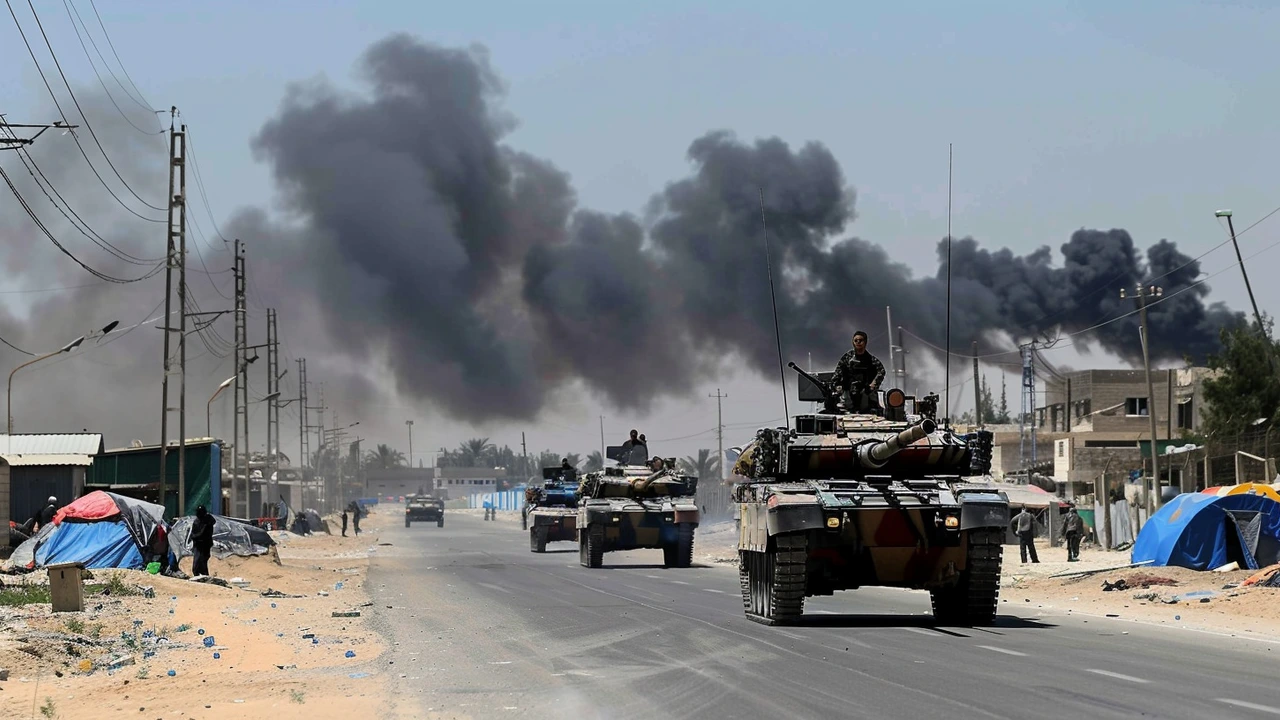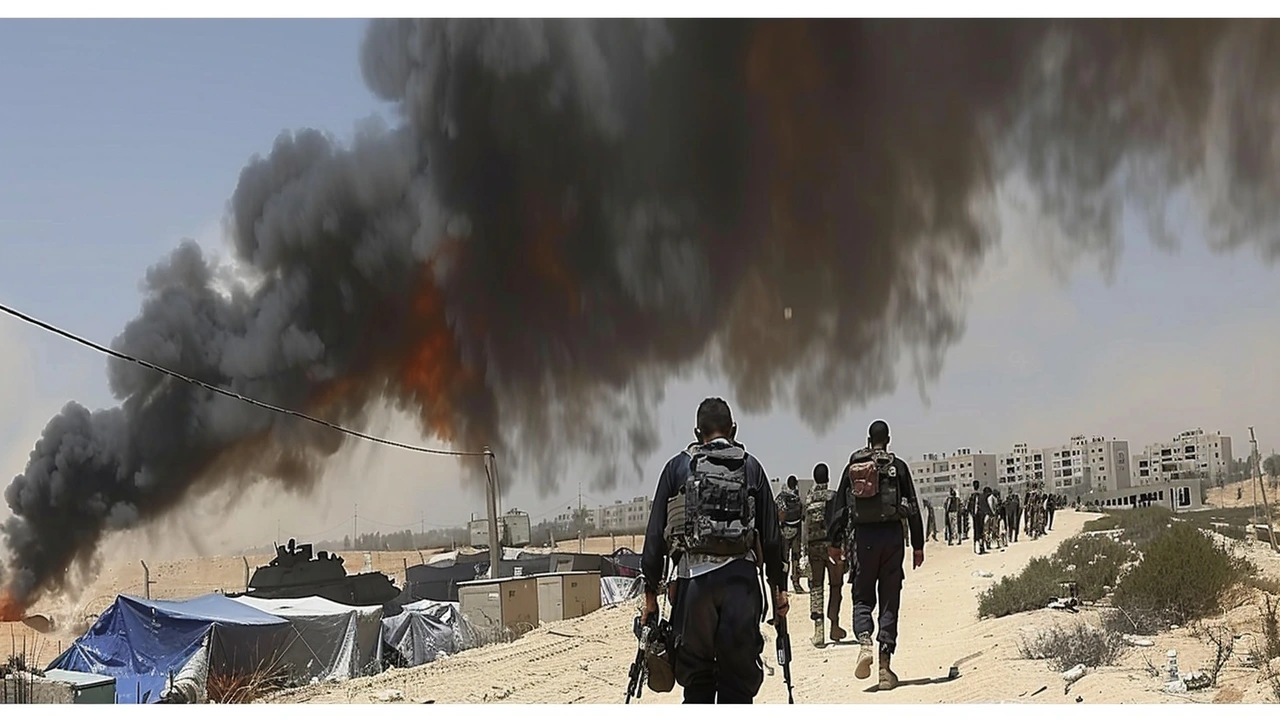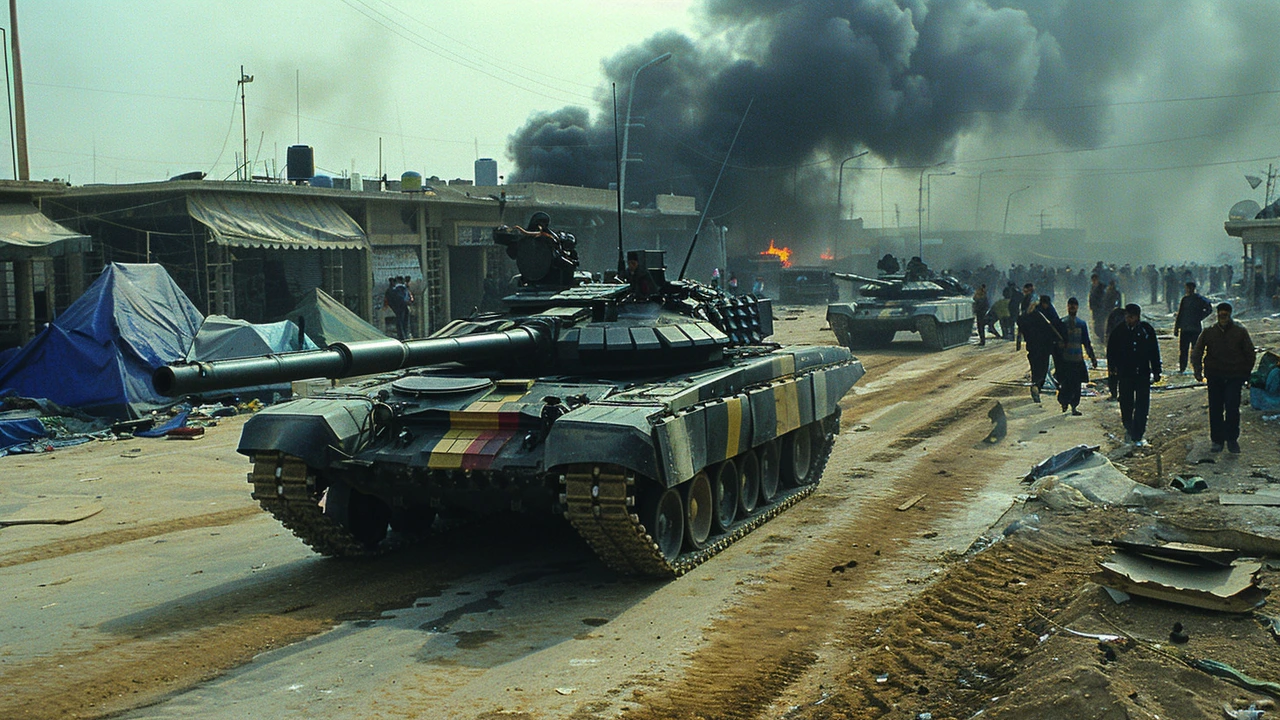29 May 2024
- 16 Comments
Israeli Military Advances in Gaza
In a significant development in the ongoing conflict in Gaza, Israeli military forces have advanced into central Rafah, a strategic city located near the Egyptian border. The latest movement, which occurred three weeks after the ground offensive began, saw Israeli tanks take control of critical locations including al-Awda roundabout and Zoroub Hill. The latter is notably the highest point along the border, giving Israeli forces a strategic advantage over the Gazan side.
The advancement marks a pivotal moment in the seven-month-long conflict between Israel and Hamas, the militant group governing Gaza. According to Israeli military sources, seizing control of Rafah is crucial for achieving security objectives, which include dismantling Hamas's operational capabilities. As Israeli tanks rolled into these key areas, the military faced both intense firefighting and treacherous terrain challenges.
Heavy Bombardment and Civilian Casualties
The push into Rafah has been accompanied by intense bombardment, raising concerns about civilian safety. Western Rafah has witnessed numerous airstrikes, resulting in the deaths of dozens of Palestinians, including those in displaced persons camps. According to the Hamas-run health ministry, the total number of deaths in Gaza has climbed to at least 36,090, a toll that has shocked international observers and humanitarian organizations.
These bombardments have forced nearly a million residents to flee their homes, with the United Nations estimating that several hundred thousand people still remain in Rafah. Many are taking refuge in increasingly overcrowded shelters, with limited access to basic necessities such as food, water, and medical supplies. This desperate situation has prompted international humanitarian organizations to call for ceasefires and the establishment of safe corridors for aid delivery.

International Response and Ongoing Conflict
Despite the grim humanitarian situation, Israeli forces continue to assert their strategic gains as necessary for national security. Israeli officials argue that controlling Rafah is essential to preventing future attacks from Hamas, which instigated the current conflict with a cross-border raid. This viewpoint, however, has not gone without international condemnation. Several global leaders and organizations have criticized Israel's tactics, urging both sides to return to negotiations.
The war has drawn stark international contrasts, with nations taking sides based on historical alliances and geopolitical interests. While some Western nations have shown support for Israel's right to defend itself, others have expressed deep concern over the rising death toll and human rights violations reported in Gaza. The United Nations Security Council has attempted to broker resolutions to halt the conflict, but achieving consensus remains elusive due to the complex political dynamics at play.
The Human Toll
The human cost of the conflict is starkly evident. Many families have been torn apart, and survivors face the psychological trauma of living through incessant bombings and the loss of loved ones. Medical facilities in Gaza, already strained before the conflict, are now overwhelmed with casualties. Hospitals are running out of critical supplies, and the constant influx of injured individuals has pushed the healthcare system to the brink of collapse.
Stories of individual resilience emerge amidst the chaos. Communities band together to provide mutual support, sharing whatever little they have. Local organizations and volunteers work tirelessly to deliver aid and relief to the affected populations, despite the risk to their own lives. These acts of solidarity highlight the human spirit's endurance even in the bleakest circumstances.

Looking Ahead
As the conflict drags on, the international community remains watchful. Diplomatic efforts to broker peace are intensifying, but sustainable solutions seem distant. Analysts warn that without meaningful negotiations and compromises from both sides, the region could be locked in a cycle of violence for years to come.
The spotlight remains on Rafah, now a symbol of both Israeli military capability and the enormous humanitarian cost of war. The coming days and weeks will likely see further developments, as each side seeks to gain an upper hand. For the residents of Rafah and Gaza at large, the hope for peace continues to be interwoven with the daily struggle for survival.
In conclusion, while the Israeli advancements in Rafah mark a significant military achievement, the overarching narrative remains one of human suffering and the urgent need for a peaceful resolution. The global community awaits with bated breath, hoping that the path to peace will prevail amid the echoes of war.


Seyi Aina
May 29, 2024Man, this so-called ‘strategic gain’ is just a fancy way of saying they’re digging themselves deeper. They think snatching a roundabout or a hill will solve anything, but the civilian toll keeps climbing. Honestly, if you’re counting victories, you’re missing the real cost.
Alyson Gray
June 4, 2024The sky over Rafah has become a canvas of dread, each explosion a brutal brushstroke.
Families that once shared laughter in bustling markets are now huddled in makeshift shelters, clutching whatever comfort they can find.
The sound of sirens is no longer a warning but a relentless lullaby that haunts every night.
Children, with eyes wide as the desert, stare at the endless horizon, wondering if peace is even a word they should know.
Doctors, exhausted beyond belief, patch up wounds with trembling hands, while the supply lines shrink to a thread.
International leaders speak in polished tones, promising resolutions that feel as distant as the stars.
Yet the dust that rises from the bombed streets carries stories of love, loss, and stubborn hope.
Mothers sing old lullabies to soothe trembling infants, their voices cracking like the cracked walls around them.
Volunteers risk their lives to deliver water, food, and a sliver of dignity, defyinately defying the chaos that threatens to swallow them.
Every ruined home tells a tale of a life interrupted, of dreams that once fluttered like butterflies.
The world watches through screens, scrolling past the anguish while hashtags fade into the background.
But inside each shattered heart beats a determination that refuses to be extinguished.
Even as the night sky erupts with fire, a faint glow of resilience rises from the rubble.
It is a reminder that humanity can endure, even when the world seems intent on breaking it.
So let us not forget the faces behind the statistics, for they are the true souls of this tragedy.
Shaun Collins
June 11, 2024Another “strategic win” while civilians keep dying.
Chris Ward
June 18, 2024Actually, I think the focus on hilltop control is overhaged – the real issue is safe corridors, lol.
Heather Stoelting
June 25, 2024We can push for humanitarian aid more than ever lets keep the pressure on!
Travis Cossairt
July 2, 2024Looks like the front line is shifting again but not sure what that means for the folks on the ground
Amanda Friar
July 9, 2024So the tanks are taking hills now? Great, maybe they’ll finally find a solid Wi‑Fi signal up there.
Sivaprasad Rajana
July 16, 2024What’s happening is that control of high ground gives artillery better range, which is why they target Zoroub Hill, but it also means more exposure for civilians below.
Andrew Wilchak
July 23, 2024Yo, everyone’s talking about the ‘strategic locations’, but honestly the real strategy should be stopping the endless cycle of violence – no more razing neighborhoods for some roundabout.
Roland Baber
July 30, 2024Remember, every conflict is a mirror of humanity’s choices; we can choose empathy over aggression, and that starts with listening to the stories from Rafah’s streets.
Phil Wilson
August 6, 2024From an operational standpoint, securing al‑Awda roundabout creates a logistical node for force projection, yet this gain is offset by the degradation of civilian C‑line infrastructures and the subsequent humanitarian fallout.
Roy Shackelford
August 13, 2024They’ll never stop until the global agenda is rewritten, the only way out is to back our troops and cut the media nonsense.
Karthik Nadig
August 20, 2024Exactly 🚨 the elites are using this ‘peace talk’ as a smokescreen while they push their hidden agenda 😡
Charlotte Hewitt
August 27, 2024And the satellite images? Totally faked to keep us scared, lol.
Jane Vasquez
September 3, 2024Wow, brilliant insight 🙄 if you spent half the time caring about actual victims you’d see the real problem.
Hartwell Moshier
September 10, 2024I hear your point but maybe we should also think about the people stuck in the crossfire.